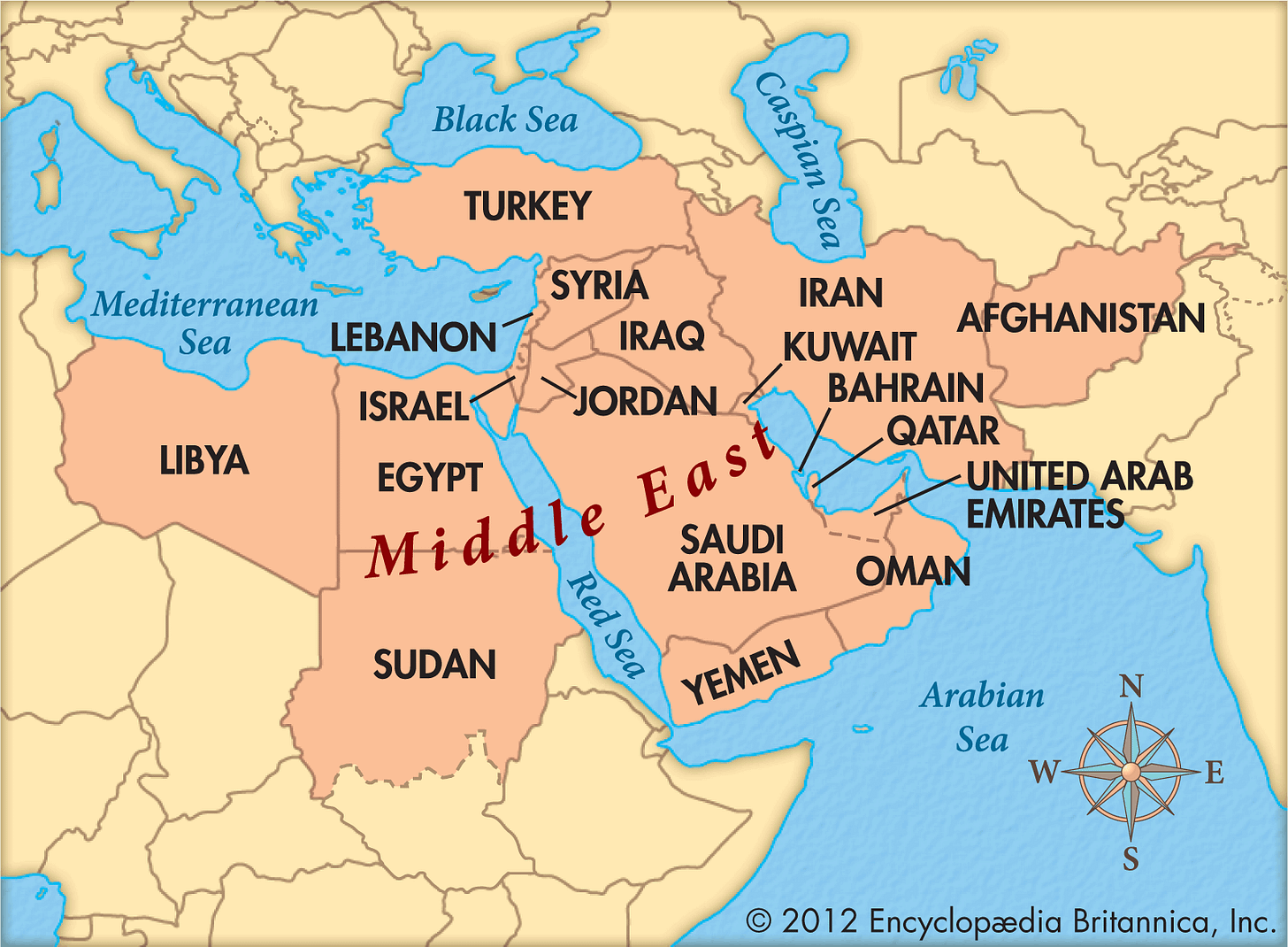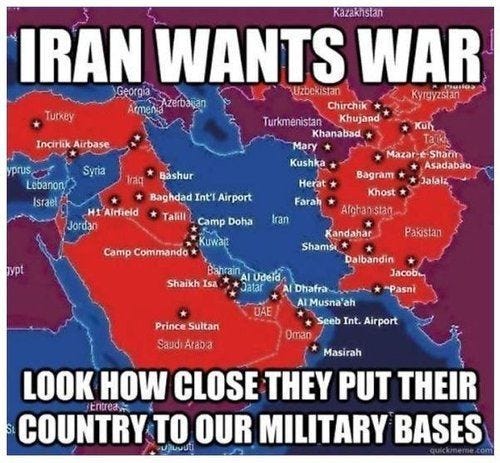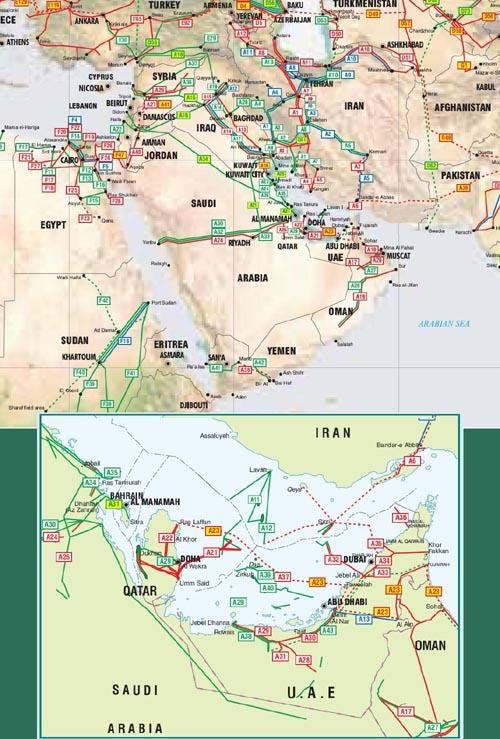Holy Wars...The Punishment Due, Part 4b
Israel and Palestine in a Dangerous Web of Geopolitical Alliances.
In Parts One and Two I looked at Theories of War and Conflict, and in 4a I looked at the history and basic positions of the Israelis and Palestinians/Hamas. Here in 4b I want to lay out the geopolitical map of Israel/Palestine and the web of geopolitical ties between those nations and the wider world.

International Support for Palestine and Hamas and its Backlash
Whereas Europe and America have traditionally backed Israel, while also trying to materially support Palestinian civilians, the rise in Islamic immigration into Europe, along with Leftwing politics, has led to large anti-Israeli protests around the world, leading to pledges to expel Muslim immigrants for anti-semitism. The list of European countries where politicians are considering expelling Muslims and/or leaving the EU/UN over its support of Palestine/Hamas includes:
and the Nordic nations of Denmark, Finland, Iceland, Norway & Sweden
Outside of Europe, EFF Marxists in South Africa (the nations' 3rd largest political party) have caused alarm by openly supporting Hamas’s use of violence:

Israel/Palestine’s Neighbors

Lebanon and Hezbollah -
To Israel’s North, beyond The Blue Line, is the country of Lebanon and terrorist group Hezbollah, a Shi’ite proxy militia aligned with Iran. Hezbollah’s leader, Hassan Nasrallah, gave a speech in early November 2023 stating that, beyond some missiles and motorcycle attacks, his organization not going to escalate their attacks against Israel into a larger war at this stage in the conflict. Speculation is that he’s concerned about a repeat of the 2006 conflict.
Foreign Policy argues that Hezbollah entering the war would set off a major regional escalation.
Syria and Assad -
Russia backs Syrian President Bashar al-Assad, and there are currently at least 14 groups fighting against him for political control of Syria in an ongoing civil war. Some of these groups have ties to Iran, Russia, and the West, such that Americans and Russians have already exchanged fire in the country.
Since Hamas’ Oct. 7 attack on Israel, Iranian-backed proxies in Syria have increased their attacks against American targets, as the US maintains garrisons, forts, and bases throughout the region.
Yemen and the Houthis -
Yemen is also currently in a state of war, and while not nearly as close to Israel geographically as Hezbollah and Iranian proxies in Syria, the Houthi rebels got in on the action and launched a wave of rocket and drone strikes against Israel when the conflict began.
The Houthi rebels’ are linked to Iran, and their enemy in the conflict is a coalition government supported by Saudi Arabia, making the conflict a proxy war for Saudi Arabia and Iran.
Egypt and Jordan -
The Israelis and Egyptians signed a peace treaty in 1979, following the Camp David Accords, which returned the Sinai Peninsula back to Egypt following its capture by Israel in the Six Days War. Egypt cannot get into a major war with Israel, or anyone else, because 90% of its population is in an incredibly delicate position living below various Nile River dams.
The kingdom of Jordan, home to two million Palestinian refugees, signed the Wadi Araba peace treaty with Israel in 1994, but the two nations have clashed on various issues ever since. The United States is the single biggest donor to Jordan.
From ABC News:
"I think the United States sees Jordan as critical for any sort of peace agreement with Israel and Palestinians. If that were to come about, Jordan would have to be a key player in this, just like Egypt," …Since Israel launched Operation Swords of Iron in response to the October 7 attack, the King has been under "tremendous pressure to cut diplomatic relations with Israel"…
…"That, of course, would impact whether the United States is willing to provide over [$AU1.65] billion in aid every year to Jordan. So he's in a difficult spot."
Publicly, the King has tried to smooth things over with pro-Palestinian protesters and condemn Israel without isolating Western allies and risk losing their funding.
Both Jordan and Egypt have resisted calls to resettle Gazan Palestinians within their borders.
The Three Big Regional Players
Iran -
Iran is the biggest and most powerful Shi’ite nation. Allied with China and Russia in its support of Hamas, and supporting a large network of proxy militias, Iran is the chief geopolitical opponent of Israel, Saudi Arabia, and NATO- and EU- aligned nations. According to USA Today, they have the world’s 7th largest army in terms of active personnel.
…Like that one time we overthrew their democratically elected government in 1953…or when we funded Saddam Hussein during the Iraq-Iran War in the 1980s…or when we threatened to destroy them in the early 2000s for being part of the Axis of Evil… or all of this…ahem.
But perhaps to make it up to them, Presidents Obama and Biden have given Iran tens of billions of dollars in the last decade in exchange for a super secret pinky promise to not build nuclear weapons, which they’re totally going to honor. From the Council on Foreign Relations, the
Joint Comprehensive Plan of Action (JCPOA), is a landmark accord reached between Iran and several world powers, including the United States, in July 2015. Under its terms, Iran agreed to dismantle much of its nuclear program and open its facilities to more extensive international inspections in exchange for billions of dollars’ worth of sanctions relief.
If you can’t trust a nation that refers to America as The Great Satan and calls for the genocidal elimination of Christians and Jews, who can you trust?
Turkey -
Like Egypt and Jordan, Turkish President Erdogan finds himself caught between Western NATO commitments and a pro-Palestinian Muslim-majority population.
The big threat here is that were Turkey to switch from NATO to Team Hamas-Iran-China-Russia, their army would be at the footstep of Europe. Behind only the United States, Turkey has the largest NATO army in terms of troop numbers, fielding ~447,000 soldiers.
Saudi Arabia -
Led by the House of Saud, it is the biggest and most powerful Sunni nation, which is now seeking nuclear missiles of their own in response to the Iranians developing them. Under the Trump presidency, Saudi Arabia was negotiating a peace treaty with Israel similar to the ones signed by Sudan, UAE, and Bahrain, but that deal is now on pause.
Saudi Arabia is significant because its the historical home of Muhammad (PBUH), containing both Medina and Mecca within its borders, and hosting the annual Hajj (one of the Five Pillars of Islam).
It also has the world’s 2nd largest reserve of crude oil (behind the US), it spends the 8th most on military spending. and it often takes a lead role with other smaller, Sunni-majority nations.
Economic Ties Throughout the Region
Finally, in addition to industry and mineral deposits, oil profits are the major economic source of power for most Middle Eastern nations. Moving the oil from the Middle East to the far reaches of the globe is a vast network of 41 oil, gas, and prodcuts pipelines, as well as shipping lanes through the regions’ various seas, straits, and gulfs.
So, if (when?) the Israeli-Palestinian conflict grows and pulls in other nations, in addition to new arenas of conflict, the world would face a major disruption to its oil supply. If it spirals all the way into WW3, the environment would take a major hit as all of the major players would likely throw environmental concerns to the wind in developing their own carbon supplies.
Good times all around!
Coming up next - CHINA!!!





